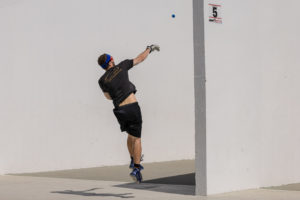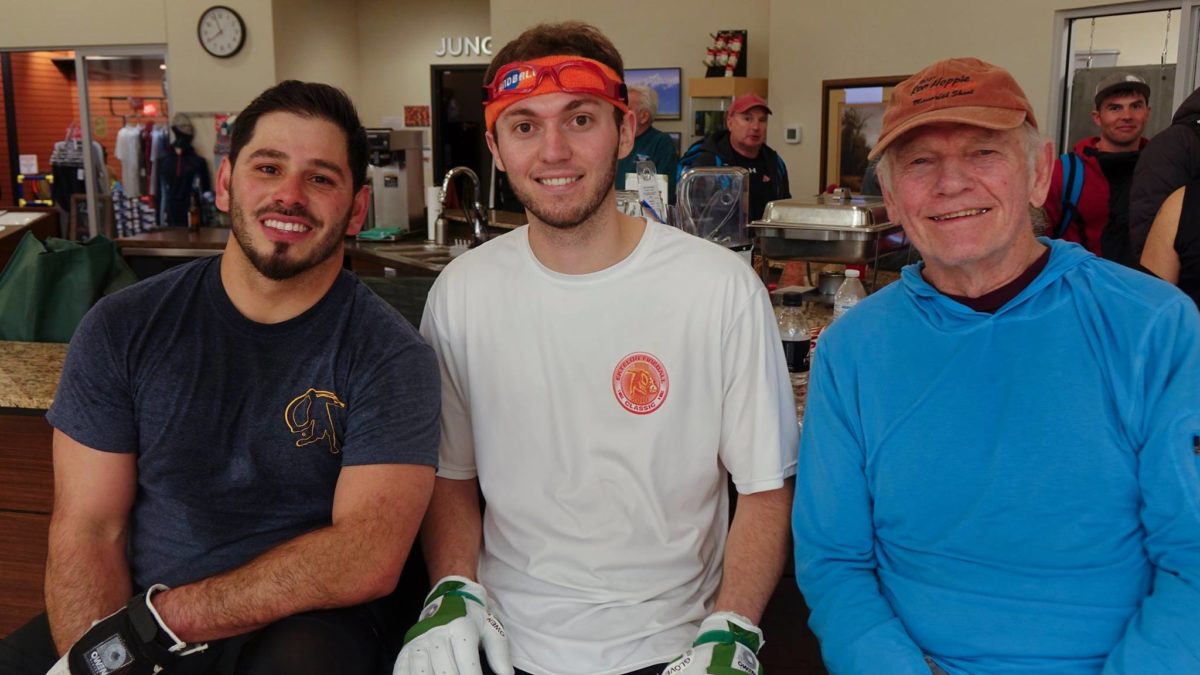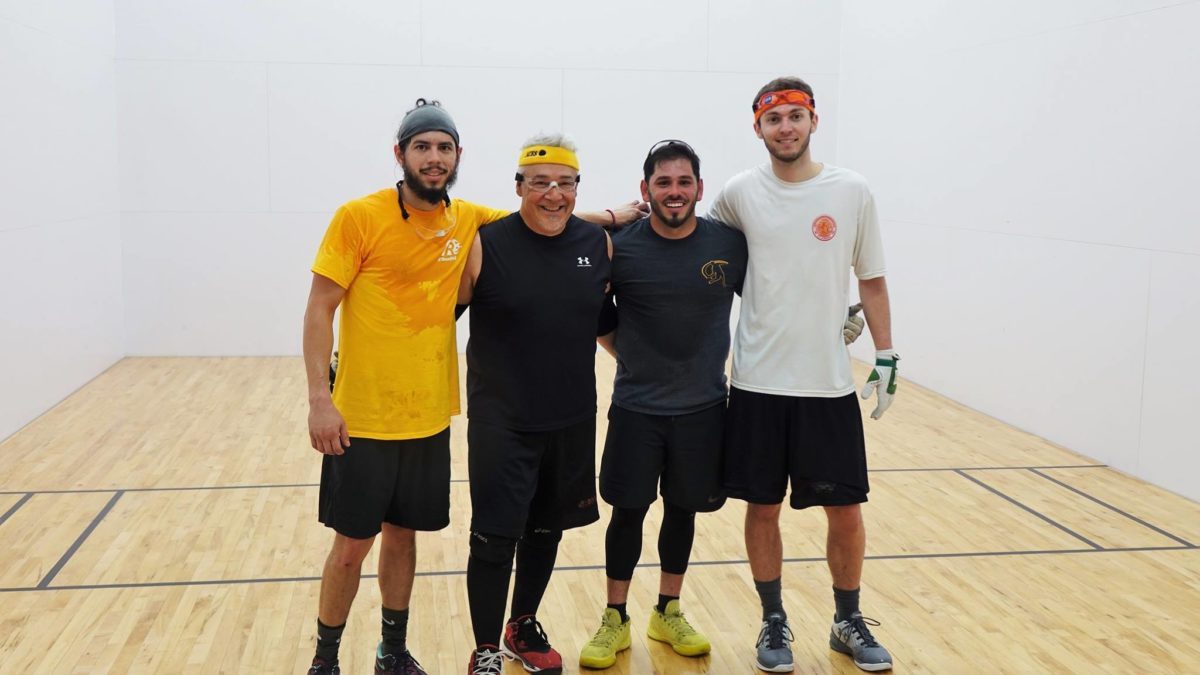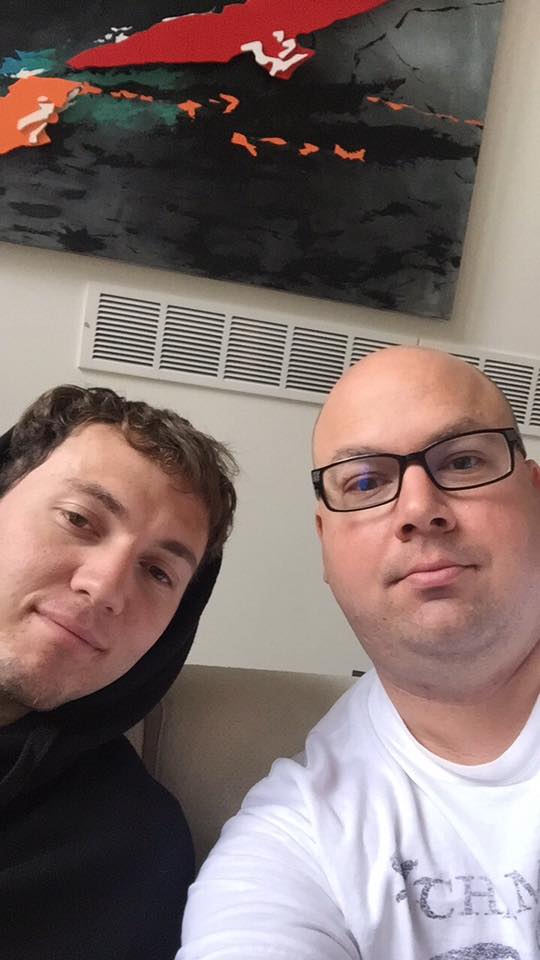Icebreaker Rising Stars Interview Series
WPH Press
John Chapman recently qualified on the WPH 3-Wall Icebreaker Pro Tour, stringing together three impressive victories at the recent Icebreaker Contenders Qualifier. A former collegiate basketball standout, John is a gifted athlete who’s game has quickly transformed in the past two years. After relocating from Montana to Colorado after graduating from college in 2018, John regularly plays with WPH top 15 pro Jonathan Iglesias and former junior standout Jon Gutierrez.
John is the brother of David Chapman, one of the all-time giants of the sport, as well as the son of Fred Chapman, one of the game’s deepest thinkers and strategists. David and Fred helped to shape John’s calm and stoic disposition, while providing him with the foundation to become a pro handball player. Not surprisingly, John lists his dad and brother as his handball heroes.
In this special of Behind the Short Line – Icebreaker Rising Stars interview, we’ll discuss John’s start in handball, what his brother and dad meant to him, what earning his WPH pro card meant to him, his goals going forward, and much more.
You picked up handball relatively late for a Chapman. What motivated you to commit to the sport in your early 20’s?
Handball has always been a part of my life obviously with my Mom, Dad, and brother all playing. When I was around 14 years old David came to Montana to play in the State Open Doubles tournament with my Dad as his partner. My dad was around 75 at the time and so naturally everyone served and hit the ball to him. It was incredible to watch how he held his own against Montana’s best and once David got control of the rally it was over. They ended up winning the tournament and it really inspired me to want to start playing the game. I played a few tournaments here and there throughout high school and college but my primary focus was always basketball. However, I always knew that once basketball was over I would start to take handball seriously.
You were a very successful basketball player, playing four years of college basketball at Montana Tech. What are the parallels to playing high-level basketball and pro handball?
The high intensity competition and ability to take over a game. In basketball it was more difficult being a team sport but in handball when you begin to take over a game it’s a great feeling. The preparation for tournaments and games are very similar as well. Getting your mind right and visualizing the game and your shots is very important in the preparation.
How is the mindset, training, preparation, and competition different in handball compared to basketball?
I’d say the mindset is very similar. You need to visualize over and over the game you are about to play. In basketball you are seeing yourself perform moves and shoot with the same release each time, and in handball you have to do the same thing. As far as training, preparation, and competition I think they are much different. The only reason I say that is because in college everything was planned out and prepped for you. You had daily film sessions, practices, and weight training and everything was planned. The coaching staff would watch hours of film and create scouting reports of each team. In handball it’s all on you. Fortunately I always had my Dad there to help me out.
You play mostly 4-Wall in Colorado, but you qualified as a pro in 3-Wall. Do you consider yourself a 3-Waller now?
I appreciate both games in their own way but I think it is still too early in my career and have had relatively similar success to consider myself one or the other. I would like to develop into a great overall handball player and win many tournaments in both games.
You entered the WPH Contenders Qualifier (May 2021) as the 10th seed and stormed to the final, defeating three very good players en route to the final. What did it mean to you to qualify as a WPH pro?
You know that’s pretty interesting, I didn’t actually know my seed until reading this question and never looked at the bracket. I wasn’t sure how I would compete without playing 3-wall for several months prior and tweaking my back a few weeks before but after my first match I was feeling really good. It feels great to qualify but I know I have a long way to go to seriously compete with the pros.
You have played mostly “A” and Open level handball, and you are now starting to play with the pros. What are the biggest differences between the A and Open compared to the pros?
There are no easy points, the pros get to everything and hardly ever make a hand error. I think I make a great shot or a great return and they just roll it out or hit a great pass like it’s nothing. Also the hop on the ball combined with power is tough to deal with, especially in 3-wall. It is a bit easier in 4-wall to have the back wall to slow things down.
By qualifying at the May WPH Icebreaker Contenders, you are now into the elite June 19 WPH Icebreaker #11 field. What will you do to prepare for your first pro stop?
My left, I really need to work on my left especially for the return of serve. Also my serve needs some tuning with more power behind it. Those are the major things I will be focusing on to get ready.
You proudly state that your brother David and your father Fred are your handball heroes. What are the most important handball lessons that David taught you?
Mindset, how to carry yourself, and controlling the rally. Every time I played with David I was still in the midst of my basketball career so he gave me tips here and there on handball but most of what he taught me was able to be translated over to the basketball court. The major thing I learned from him is to take your time during the rally until you have a great set up. I try to go to the ceiling and hit pass shots and wait for them to make a mistake. It makes the game a lot easier to control instead of constantly chasing the ball around the court.
What are the most important handball lessons that your dad taught you?
Anticipation and positioning. I hear him every time on the court say “I could have ran on the court and gotten that ball and I’m sitting out here in the stands.” It could be a flat rollout and he would still be saying it. Being in the correct position and never catching yourself standing puts yourself in a great spot to stay in the rally. When I first started playing I found myself hitting and standing allowing the opponent to basically hit it wherever they wanted and score without any pressure. If you get every ball back it puts a lot of pressure on the opponent to hit perfect shots.
Were there certain shots and/or strategies that David and Fred taught you?
A more defense game I would say. Forcing your opponent to make mistakes to allow yourself the best shots and opportunities. The most used shots I learned from them are back wall kills, ceiling fist shot, dump shots to the corners, re-kills, overhand ceilings, and the fist pass shot. Another shot I have learned is taking a back wall left wall shot with my right hand. It comes at a weird angle but opens up a lot more shots and can be an easy set up. I still have a ways to go for them to be at a top level.
You have watched so many of David’s matches, and had a chance to play with him a number of times. Your swing and mannerisms bear an uncanny resemblance to “The Great One.” Is that by design?
Yes I have watched David’s matches over and over again and it’ll take me several hours to get through a match because I rewind his shots repeatedly. I try to watch how he bounces the ball, how he steps, his swinging motion, how he stands waiting for his opponent to serve, and every aspect of his game. I visualize them and when I get onto the court I try to perform those shots and practice them. I have a long way to go and still can’t hit a lot of his shots like I would like to.
Now that you have qualified as a WPH pro, what are your goals going forward?
The first step going forward is I want to be a serious contender on the pro tour in both 3-wall and 4-wall. I want to go to as many tournaments as possible to allow myself to continue to play the top players. I think that is the best way to improve my game. Hopefully that will lead to being one of the top players and begin winning some tournaments.
Which pros do you most enjoy watching today and why?
The pros I enjoy watching today are Killian Carroll, Lenning, Martin Mulkerrins, Dave Fink, and the Cordovas.
Is there a pro that you try to emulate and why?
David is who I try to emulate the most. I love his overall game from his strategic defensive game to his wide range of offensive shots. The 2 shots I really want to master are the pass shot down the left and his dump shots to the corners.
You do not give anything away on the court. Fans cannot tell if you won or lost. Have you always employed this temperament, or has this been learned through years of competition?
I have always had that type of temperament. Especially in big tournaments or games I try to stay laser focused till the end. In handball it is a little more difficult because tournaments can last a few days so even after a couple of wins I still stay focused even while waiting for my next match.
What do you need to improve to challenge the best in the game?
My left hand, pass shots, re-killing, and finishing the rally on easy set-ups are the main components I need to improve on while developing the rest of my game.
Word Association
Clark Park – WPH 3-wall headquarters
Paul Brady – top 2 of all time
Killian Carroll – Current best player
Max Langmack – tall pro, first partner in a Pro/Am at Red Death
Sam Esser – solid player
Leo Canales, Jr. – first pro I lost to in singles tournament
Pictures courtesy of the WPH and John Chapman
David Fink
WPH Senior Writer














